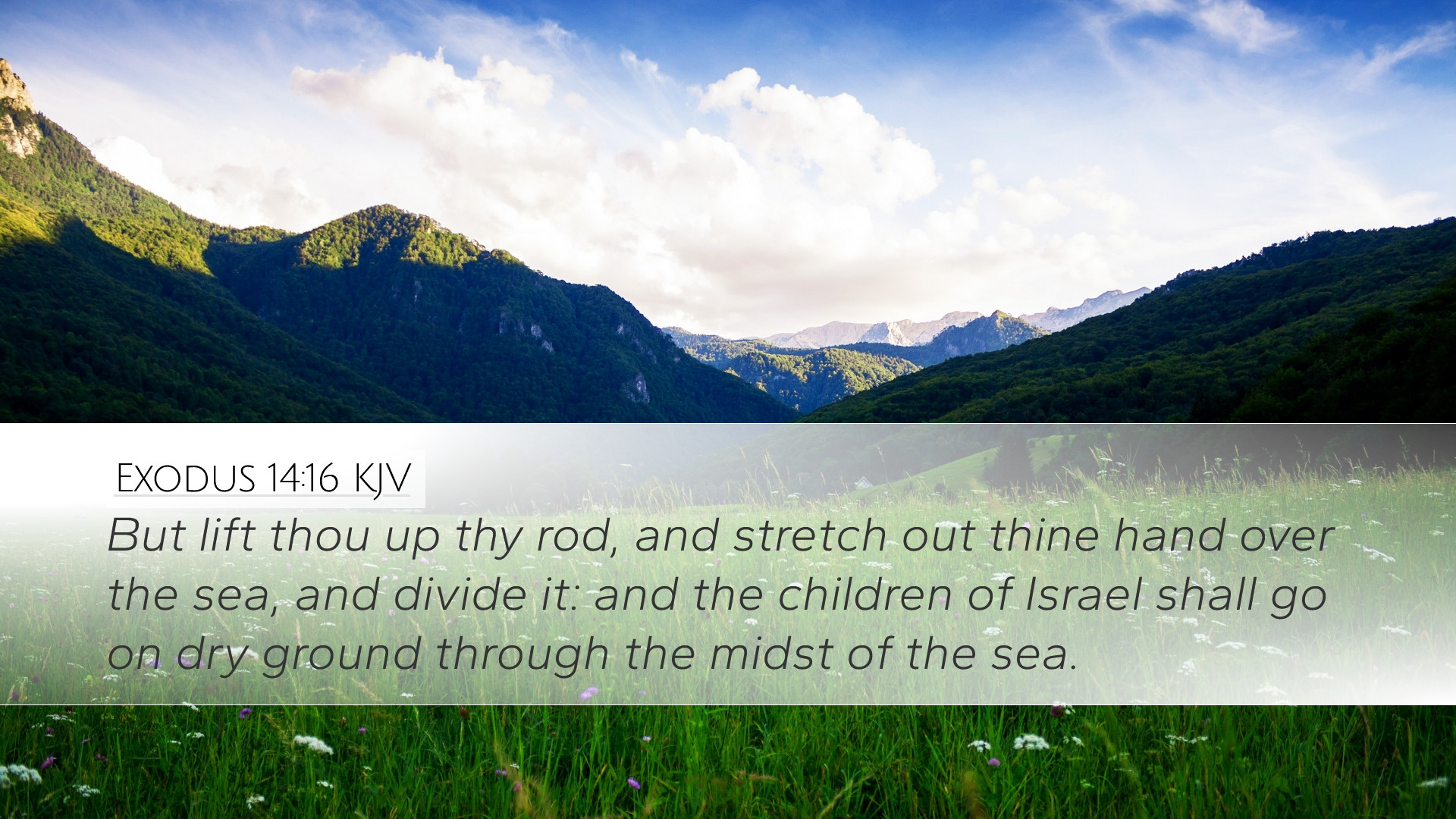Commentary on Exodus 14:16
Exodus 14:16 (ESV): “Lift up your staff, and stretch out your hand over the sea and divide it, that the people of Israel may go through the sea on dry ground.”
Introduction
This pivotal verse occurs during a defining moment for the Israelites, providing rich theological insights and practical applications that remain relevant today. Notable commentaries have reflected on the miracle of the Red Sea and its implications for faith, deliverance, and divine intervention.
Divine Command and Human Action
Matthew Henry emphasizes that God's command to Moses demonstrates the cooperation expected between divine sovereignty and human agency. The act of lifting up the staff signifies obedience to God's instructions, acting as a means through which God's power is revealed. It is essential to recognize that while God is the ultimate deliverer, He often requires humans to act in faith.
Albert Barnes adds that this command was not just for the immediate purpose of parting the sea but served as a reassurance to the Israelites of God’s presence and power. The staff, symbolizing God's authority, becomes a tool for miraculous intervention. It reminds the faithful that God instructs and guides them to act according to His will in times of crisis.
The Symbolism of the Staff
Adam Clarke interprets the staff as emblematic of God's power and leadership. Throughout Exodus, the staff transitions from a simple shepherd's tool to a symbol of divine authority. Clarke notes that the act of stretching out the staff signifies the transition of the Israelites from bondage to liberation, highlighting the transformational nature of God's redemptive work.
The Miracle of the Red Sea
The parting of the Red Sea is one of the most recorded miracles in Scripture, attesting to God's omnipotence. Henry points out that this act reflects God's covenantal promise to Israel and serves as a testimony to future generations of His unmatched power over creation. The act of walking on dry ground underscores not only the miraculous nature of the event but also God's intention to provide a safe passage for His people.
Barnes further elaborates that this account serves as a prefiguration of Christ's ultimate act of deliverance. Just as the Israelites passed through the sea to freedom, believers are invited to encounter the new life found in Jesus, who leads them away from the bondage of sin.
Theological Implications
Exodus 14:16 brings forth several theological themes for scholars and clergy to consider:
- Faith and Obedience: The necessity of stepping out in faith to see God's work can be a significant teaching point. Moses had to trust God's word despite the apparent impossibility of the situation.
- God's Power: The miracle serves not only as a demonstration of divine power but also showcases God's ability to intervene in human history. The event reinforces the belief that God is actively involved with His creation.
- Redemption: This passage echoes the redemptive narrative prevalent throughout Scripture. Scholars often draw parallels between the Exodus and the salvation narrative in the New Testament.
Practical Applications
For pastors and theologians, the context and meaning of Exodus 14:16 can foster deeper teaching and application within congregations:
- Encouragement in Crisis: Just as God provided a way for the Israelites, individuals in moments of distress can find solace in the assurance of God’s deliverance.
- Call to Action: Believers are reminded that they must partake in their faith journey actively. Lifting up their metaphorical 'staff' becomes a call to engage with God’s plans.
- Trust in Divine Timing: The situation of the Israelites at the sea highlights the importance of patience and trust in God's timing amidst dire circumstances.
Conclusion
Exodus 14:16 encapsulates a moment where God's command and human action converge, showcasing divine intervention at its finest. The perspectives offered by Matthew Henry, Albert Barnes, and Adam Clarke provide a rich tapestry of insights that pastors, theologians, and students of scripture can deepen their understanding of God's redemptive work in history. As they reflect on this verse, may they encourage their communities to trust in God's power and guidance as exemplified in the journey of the Israelites, making it a timeless message of hope and faith.


